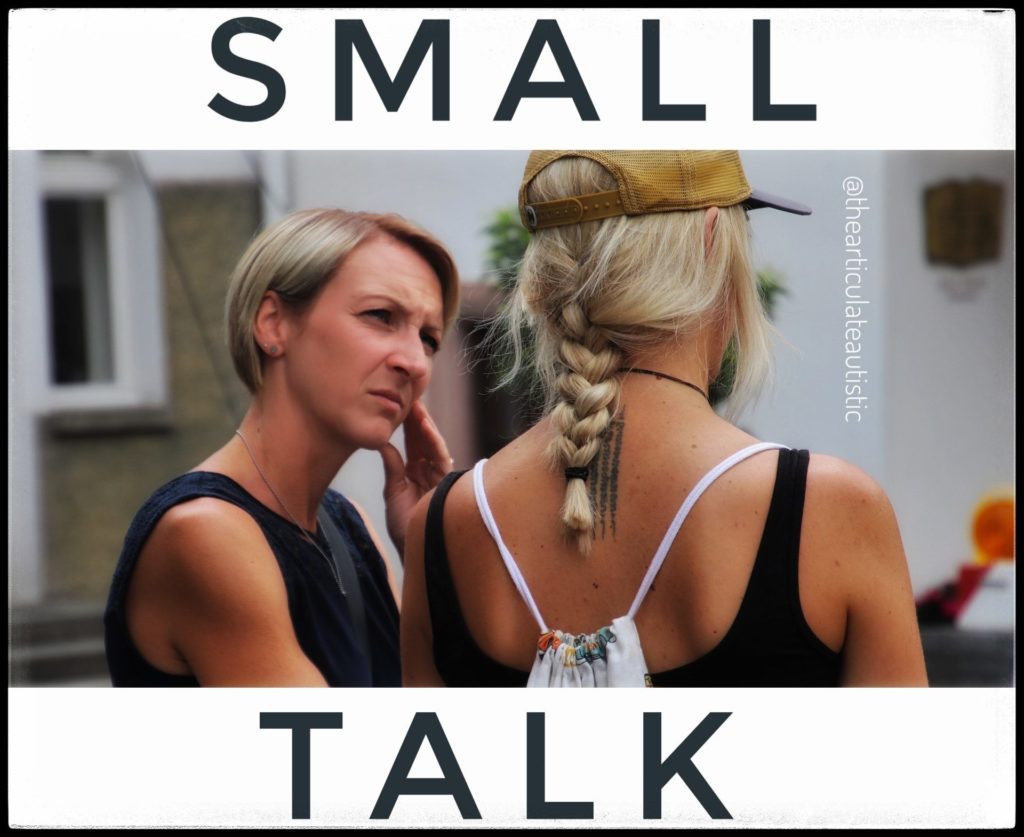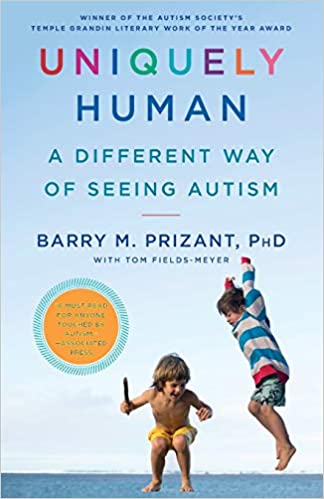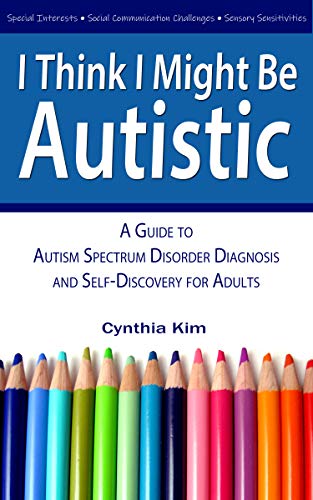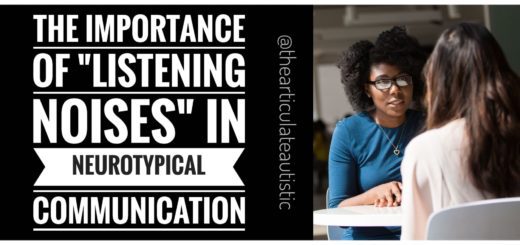Why Small Talk Is Important for Neurotypicals (An Autistic Perspective)

For the longest time, I could not figure out why non-autistic people have a tendency to engage in small talk so frequently with one another.
It made me think of wider society as shallow and vacuous because I literally thought that topics like reality shows, dinner, and French fries were of all-encompassing importance to non-autistic people.
Turns out, non-autistic people use small talk as a tool to ease their way into discussions about deeper topics while “testing the waters” with safe topics first.
Neurotypical people also use small talk as a way to read facial expressions, mannerisms, and body language to see if this is someone they are interested in getting to know better.
Therefore, WHAT they are talking about isn’t nearly as important as HOW they were talking about it and what they are perceiving from their conversation partner.
For autistic people, preamble is not much of a thing. We think it, we feel it, we express it; whether we’ve known you for 20 seconds or 20 years.
Also, since we rely quite a bit on literal language, we tend to convey our messages verbally, saying exactly what we mean and meaning exactly what we say. No subtext.
(Article continues below.)
The best way to improve communication with your autistic loved one is to understand how your autistic loved one’s mind works! Intentions, motivations, and personal expressions (facial expressions or lack thereof, body language, etc.), are often quite different in autistic people than they are in neurotypical people.
Experience a better understanding of your autistic loved one by reading books about life from an autistic perspective as well as stories that feature autistic characters. You’ll have so many “Ah ha!” moments and start seeing your autistic loved one in a different light (and you’ll have a better understanding of their behaviors, which you may have been misinterpreting up until now).
Books I recommend for a better understanding of your autistic loved one:
To non-autistic people, this approach can look abrupt and awkward, for autistic people, this is a perfectly acceptable way of exchanging information in the most efficient and accurate way possible.
Also, we rarely hurt each other’s feelings communicating in this way.
I think until we truly understand the literal purpose of small talk, it can look very strange and confusing for autistic people to see so many of our non-autistic counterparts enthusiastically chatting about the weather and other innocuous topics so often, even around people we see frequently.
I think taking small talk at face value and literally is what made me mistakenly misinterpret this as shallowness when it was anything but.
Follow me on Instagram.
Want downloadable, PDF-format copies of these blog posts to print and use with your loved ones or small class? Click here to become a Patreon supporter!







I still think it is shallowness. 90% of the time they never get deeper than small talk.
Right ?!
I don’t consider it to be small talk if it goes somewhere else than the surface of a subject.
It’s so frustrating when NT ask questions just to get to something else. Like, if you’re not really interested to know how I’m doing, why do you even ask ?
It’s definitely shallow. But I think the point of it is that the goal of “socialization” should be treated almost like a business transaction. Like “networking.” Even when it’s not supposed to be a business transaction. They’re trying to assess if the person will be dependable to exchange resources (mental, emotional, physical, and/or financial) with. And then only after a certain number of years of dependability, then they can feel that trust is established enough to be vulnerable and be close. I guess it makes sense in a way, especially since we get burned so often for being too trusting.
Why shouldn’t it be shallow? As if neurotypicals deserve all of their feelings and I deserve none of my own. Let there be gas lighting and may the best argument win. After decades of a special interest in being normal, at the expense of learning anything else, driven by mountains of self loathing, I just don’t care anymore. They can be as indignant and petty and obtuse as they want and I’m finally prepared to stare back with a stone face and say “what?” instead of beating myself up for months or years trying to understand one problem.
Love your rebel attitude, and I agree with the underlying sentiment and principle!
I have recently had a perspective shift that resonates with yours:
BIG PICTURE: 1. Not all Communication Cultures value the same level of PASSIVITY, SMALL TALK, BS niceties, etc.
2. Just because one culture values Small Talk over Candor, doesn’t mean that the communication culture of your current location is morally or practically superior.
3. It’s only inherent values are in maintaining social order and understanding and comprehension in the current moment. This includes positive feelings and belonging. Moreover, most large cities are home to a panoply of cultures and conversational norms, so who is to say whose is best?
4. People need a very simple base line for conversational norms to be understood across differences in background, but beyond a general baseline, once people start expecting very specific amounts of small talk and being upset when others don’t reciprocate, it becomes ineffective, stressful, and unreasonable.
5. So we should spread the “good news” and encourage EVERYONE to GET OFF THEIR HIGH HORSE and realize that there is NO ONE RIGHT WAY to communicate, when it comes to small talk or directness. Think of Japanese culture or the “Queen’s English” vs German /European, and Vulcan communication styles. They are all different, not necessarily better.
(Although, some customs are inherently better for personal stress levels and reducing conflict, but that’s another big topic).
It definitely feels tiresome and annoying to participate in. But I once saw someone compare small talk to a dog wagging its tail, just to say “hello, I’m friendly and want to interact with you!” So now that’s what I imagine when they talk about something boring or repetitive.
They usually don’t have anything important to say, they just want to be around you or want your direct attention for a few minutes, and that makes them happy. Or at least I think that’s what’s happening?
Oh, God. That’s actually adorable! I love it! lol!